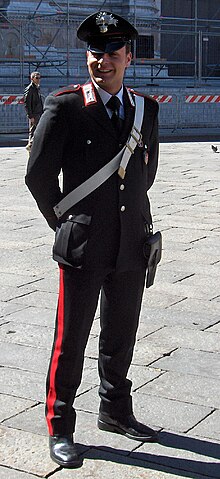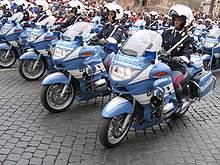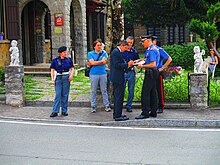
Back تطبيق القانون في إيطاليا Arabic Polizei (Italien) German משטרות איטליה HE Forze di polizia italiane Italian イタリアの警察 Japanese Politiet i Italia NB Policja (Włochy) Polish Polisen i Italien Swedish



Law enforcement in Italy is centralized on a national level, carried out by multiple national forces, helped by few limited local agencies. The Italian law enforcement system is considered complex, with multiple police forces and other agencies taking part in different duties.[1] Policing in the Italian system refers to the duties of "full-powered officers" coming from the four national main forces: Polizia di Stato (State Police), Carabinieri, Polizia Penitenziaria and Guardia di Finanza (Financial Guard). While the duties of these four corps' include investigating and arresting, other local forces carry out limited duties.
The two main police forces in the country are the Carabinieri, the national gendarmerie, as well as the Polizia di Stato, the civil national police. The third one is the Guardia di Finanza, a militarized police force responsible for dealing with financial crime, smuggling, illegal drug trade, and others. The main forces are managed and organized on a provincial level under the authority of the Questore (the local head of police) in accordance with the Prefetto, the provincial representative of the Government.[2] Border and Maritime patrolling are undertaken by the Guardia di Finanza and Guardia Costiera (coast guard). The Polizia Penitenziaria (Prison Police) is the national prison police agency, controlling penitentiaries and inmate transfers. The Corpo Forestale dello Stato (State Forestry Corps) formerly existed as a separate national park ranger agency,[1][3] but was merged into the Carabinieri in 2016.[4] Although policing in Italy is primarily provided on a national basis,[3] there also exists Polizia Provinciale (provincial police) and Polizia Municipale (municipal police).[1]
Law enforcement in Italy is an exclusive function of the State and is organized under the Ministry of the Interior, with provincial division and jurisdiction.[5] The highest office in charge of law enforcement is the ministerial office of "Dipartimento della Pubblica Sicurezza".[2][6] The Carabinieri are also Military Police for the Italian Armed Forces, in charge of investigation or intervention inside Public Administrations and personal rights violations. There is also a section of the President of Republic safety corps called Corazzieri. Carabinieri stations are usually distributed all over the country, with a station approximately in every municipality, with additional stations in strategical positions along the motorways.[7]
In 2005, the total number of active police officers in all of the agencies was 324,339 in Italy, the highest number in the European Union both overall and per capita, twice the number of agents in the similarly sized United Kingdom.[8]
- ^ a b c Reece Walters (2013). "Eco Mafia and Environmental Crime". In Kerry Carrington; Matthew Ball; Erin O'Brien; Juan Tauri (eds.). Crime, Justice and Social Democracy. Crime, Justice and Social Democracy: International Perspectives. Palgrave Macmillan. p. 286. doi:10.1057/9781137008695_19. ISBN 978-1-349-43575-3.
- ^ a b "The Public Security System in Italy". Archived from the original on 2017-10-13. Retrieved 2019-06-10.
- ^ a b Paulo Buonanno; Giovanni Mastrobuoni (2013). "Centralized versus Decentralized Police Hiring in Italy and the United States". In Philip J. Cook; Stephen Machin; Olivier Marie; Giovanni Mastrobuoni (eds.). Lessons from the Economics of Crime: What Reduces Offending?. MIT Press. p. 193. doi:10.7551/mitpress/9780262019613.001.0001. ISBN 978-0-262-01961-3.
- ^ Grazia Maria Vagliasindi (2017). "Environmental Criminal Law in Italy". In Andrew Farmer; Michael Faure; Grazia Maria Vagliasindi (eds.). Environmental Crime in Europe. Modern Studies in European Law. Bloomsbury.
- ^ "Field Organization". Polizia di Stato (in Italian). Retrieved 2021-10-06.
- ^ "Administration and Logistics". Poliziadistato.it. Retrieved 9 November 2021.
- ^ "Stazioni Carabinieri". Carabinieri.it (in Italian). Retrieved 2021-10-06.
- ^ "Crime and Criminal Justice - Issue number 19/2008 (KS-SF-08-019)". Archived from the original on 12 August 2011. Retrieved 9 November 2021.
© MMXXIII Rich X Search. We shall prevail. All rights reserved. Rich X Search